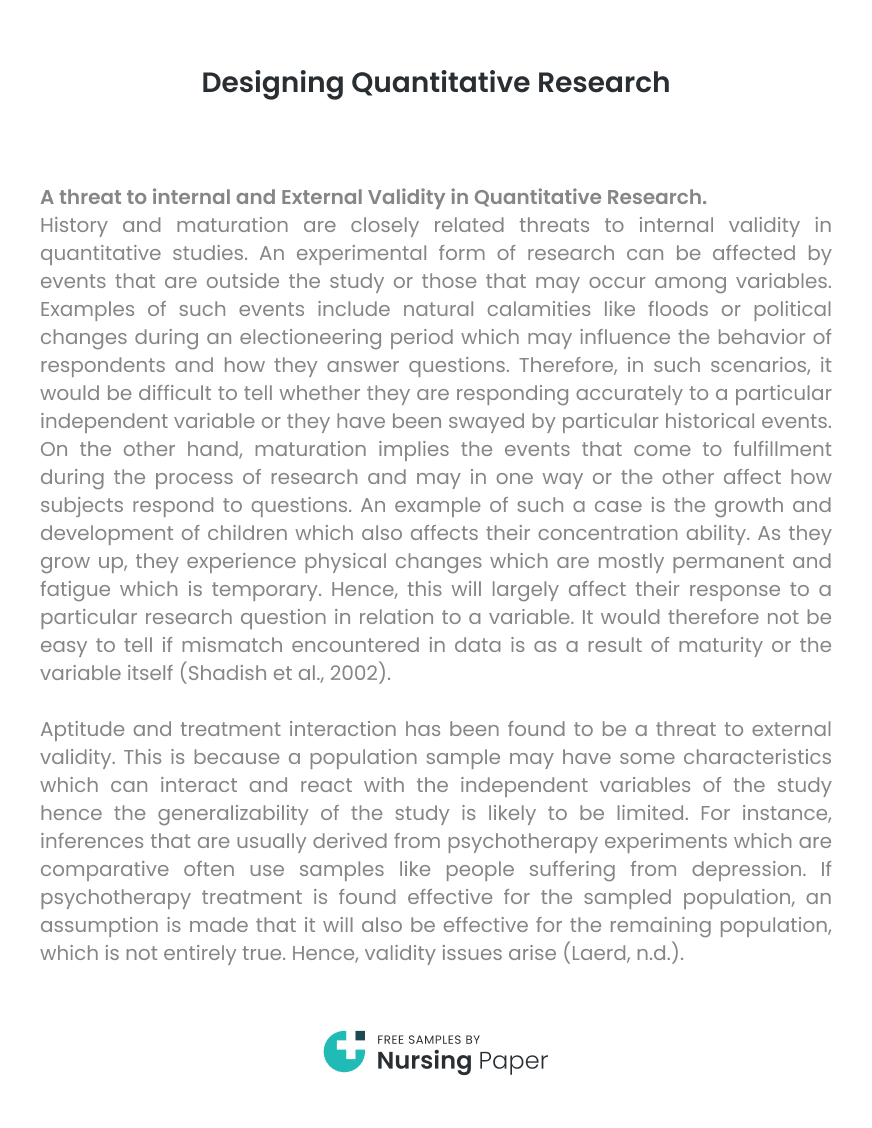
Designing Quantitative Research
A Threat to Internal and External Validity in Quantitative Research
History and maturation are closely related threats to internal validity in quantitative studies. An experimental form of research can be affected by events that are outside the study or those that may occur among variables. Examples of such events include natural calamities like floods or political changes during an electioneering period which may influence the behavior of respondents and how they answer questions. Therefore, in such scenarios, it would be difficult to tell whether they are responding accurately to a particular independent variable or they have been swayed by particular historical events. On the other hand, maturation implies the events that come to fulfillment during the process of research and may in one way or the other affect how subjects respond to questions. An example of such a case is the growth and development of children which also affects their concentration ability. As they grow up, they experience physical changes which are mostly permanent and fatigue which is temporary. Hence, this will largely affect their response to a particular research question in relation to a variable. It would therefore not be easy to tell if mismatch encountered in data is as a result of maturity or the variable itself (Shadish et al., 2002).
Aptitude and treatment interaction has been found to be a threat to external validity. This is because a population sample may have some characteristics which can interact and react with the independent variables of the study hence the generalizability of the study is likely to be limited. For instance, inferences that are usually derived from psychotherapy experiments which are comparative often use samples like people suffering from depression. If psychotherapy treatment is found effective for the sampled population, an assumption is made that it will also be effective for the remaining population, which is not entirely true. Hence, validity issues arise (Laerd, n.d.).


Strategies to Mitigate Validity Threats
History and maturation as threats to internal validity in quantitative studies can best be solved through the use of control groups. These control groups should be sampled from the target population of the study and which share a common history with the whole group under investigation. It would also be prudent to conduct experiments within shorter periods of time to avoid historical and maturation threats. The aptitude and treatment interaction can best be dealt with through re-calibration or reprocessing of study findings to solve all problems related to differences in population. By so doing, valid and generalizable findings will be produced even in cases which do not favor the performance of experiments (Laerd, n.d.).
Ethical Issue in Quantitative Research in Relation to Design Decisions
Informed consent is a very critical ethical requirement in any kind of research. In particular, for quantitative studies, it is important for a researcher to make prior arrangements on the kind of information that will be collected from respondents and the process that will be used to collect it. Informed consent demands that the scholar must explain to all study participants the aspects of the research including risks and benefits (if any) before they can agree to take part in the study. Therefore, as the researcher prepares the design, he/she must put all these into consideration as part of research ethics (Sanjari et al., 2014).
Amenability of a Research Topic in Scientific Study
An amenable research topic is that which in which involves a big number of participants and employs the use a variety of methods of finding a solution to the research problem at hand (Lamont & White, 2005).

1. Laerd. (n.d.). Internal validity. Retrieved from, http://dissertation.laerd.com/internal-validity.php
2. Lamont M. & White P., (2005).Workshop on Interdisciplinary Standards for Systematic Qualitative Research. Cultural Anthropology, Law and Social Science, Political Science, and Sociology Programs National Science Foundation.
3. Sanjari, M., Bahramnezhad, F., Fomani, F. K., Shoghi, M., & Cheraghi, M. A. (2014). Ethical challenges of researchers in qualitative studies: the necessity to develop a specific guideline. Journal of Medical Ethics and History of Medicine, 7, 14.
4. Shadish, W. R., Cook, T. D., & Campbell, D. T. (2002). Experimental and quasi-experimental designs for generalized causal inference. Boston, MA: Houghton-Mifflin.



The download will start shortly.

The download will start shortly.
 Subject:
Medicine
Subject:
Medicine  Number of pages: 8
Number of pages: 8  Subject:
Health and Social Care
Subject:
Health and Social Care  Number of pages: 3
Number of pages: 3  Subject:
Health and Social Care
Subject:
Health and Social Care  Number of pages: 2
Number of pages: 2  Subject:
Nursing
Subject:
Nursing  Number of pages: 12
Number of pages: 12  Subject:
Medicine
Subject:
Medicine  Number of pages: 4
Number of pages: 4  Subject:
Health and Social Care
Subject:
Health and Social Care  Number of pages: 3
Number of pages: 3  Subject:
Medicine
Subject:
Medicine  Number of pages: 3
Number of pages: 3  Subject:
Health and Social Care
Subject:
Health and Social Care  Number of pages: 6
Number of pages: 6  Subject:
Health and Social Care
Subject:
Health and Social Care  Number of pages: 4
Number of pages: 4  Subject:
Medicine
Subject:
Medicine  Number of pages: 3
Number of pages: 3  Subject:
Health and Social Care
Subject:
Health and Social Care  Number of pages: 9
Number of pages: 9  Subject:
Nursing
Subject:
Nursing  Number of pages: 3
Number of pages: 3  Subject:
Nursing
Subject:
Nursing  Number of pages: 2
Number of pages: 2  Subject:
Nursing
Subject:
Nursing  Number of pages: 3
Number of pages: 3  Subject:
Nursing
Subject:
Nursing  Number of pages: 6
Number of pages: 6 
